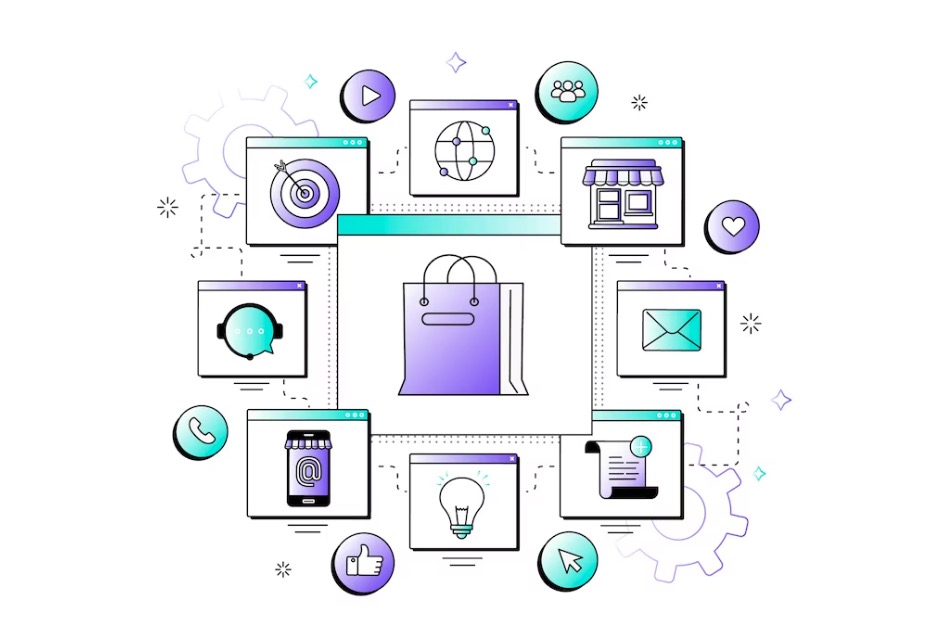I. Introduction
In today’s fast-paced and competitive business landscape, having an online presence is essential for the success of any ecommerce business. But having just an online store is not enough to get customers. In order to stay ahead of the curve and succeed in the ecommerce world, it is essential to expand your reach and tap into new markets. This is where multi-channel management comes in.
Multi-channel management is the process of managing and selling products through various channels, such as online marketplaces (Amazon, Ebay, Etsy etc.) social media platforms, and your own website. By leveraging multiple channels, ecommerce businesses can reach a wider audience and increase their visibility, which can finally lead to increased sales.
In order to truly understand the role of multi-channel management in expanding your ecommerce reach, it is important to first understand what it entails. Multi-channel management involves managing various sales channels, which can include:
- Online marketplaces
- Social media platforms
- Brick-and-mortar stores or pop-up shops
- Company-owned ecommerce websites
The goal of multi-channel management is to create a cohesive and integrated shopping experience for customers, regardless of which channel they choose to purchase from. This can be achieved through consistent branding, pricing, and messaging across all channels.
In addition to expanding your reach, multi-channel management can also provide a number of other benefits for ecommerce businesses. These include:
II. Understanding Multi-Channel Management
A. Definition of multi-channel management
Multi-channel management refers to the process of managing and selling products through various channels in order to expand ecommerce reach. This includes online marketplaces, social media platforms, brick-and-mortar stores, and company-owned ecommerce websites. The goal of multi-channel management is to create a cohesive and integrated shopping experience for customers, regardless of which channel they choose to purchase from.
B. Explanation of how multi-channel management helps in expanding ecommerce reach
By leveraging multiple channels, ecommerce businesses can reach a wider audience and increase their visibility. Multi-channel management can also help diversify sales channels, reduce reliance on any one particular channel, and enhance the customer experience.
C. Types of channels that can be managed through multi-channel management
Basically There are many types of different channels that can be managed through multi-channel management:
- Online marketplaces: Platforms such as bol.com, eBay, and Etsy allow businesses to sell their products on a large scale, reaching a wide audience of potential customers.
- Social media platforms: Facebook, Instagram, and Pinterest can be used to showcase products and drive traffic to a business’s ecommerce website or storefront.
- Brick-and-mortar stores: Physical stores or pop-up shops can provide customers with a tactile experience and allow businesses to reach customers who may not be as comfortable with online shopping.
- Company-owned ecommerce websites: An ecommerce website is a business’s primary sales channel, and is essential for creating a consistent and integrated shopping experience across all channels.
By managing these channels through a centralized platform, ecommerce businesses can ensure consistency in branding, pricing, and messaging, and provide customers with a seamless and integrated shopping experience.
In the next section, we will explore the benefits of multi-channel management in more detail.

III. The Benefits of Multi-Channel Management
A. Increased visibility and exposure
Multi-channel management gives ecommerce organizations more exposure and visibility, which is one of its main advantages. By leveraging multiple channels, businesses can reach a wider audience of potential customers, which can ultimately lead to increased sales and revenue. For example, a business selling on Amazon and eBay can potentially reach millions of customers who may not have found their website otherwise. Additionally, by diversifying sales channels, businesses can reduce their reliance on any one particular channel, helping to mitigate the risks associated with changes in algorithms or policies on any one platform.
B. Diversification of sales channels
Diversification of sales channels is another important benefit of multi-channel management. By selling through multiple channels, businesses can diversify their sales channels and reduce their reliance on any one particular channel. This can lessen the risks caused on by adjustments to the algorithms or regulations on any particular platform. For example, if a business’s primary sales channel is their ecommerce website, changes in search engine algorithms could potentially lead to a decrease in traffic and sales. By diversifying their sales channels and selling through multiple platforms, businesses can help reduce the impact of such changes.
C. Enhanced customer experience
Providing a seamless and integrated shopping experience across all channels is essential for enhancing the customer experience. By leveraging multi-channel management, businesses can create a consistent brand experience for customers, regardless of which channel they choose to purchase from. For example, a customer who discovers a product on Instagram should be able to easily find that same product on the business’s website, with consistent pricing and messaging. This may improve consumer retention and loyalty.
.
D. Improved data insights
Multi-channel management can also provide businesses with improved data insights, which can be used to make informed decisions about sales and marketing strategies. By collecting data from multiple channels, businesses can gain a deeper understanding of their customers’ behavior and preferences, as well as identify trends and patterns in sales data. This data can be utilized to enhance product offers and boost marketing strategies.
In the next section, we will explore the challenges associated with multi-channel management for e-commerce business owners.
IV. Challenges of Multi-Channel Management
A. Complexity and fragmentation
The complexity and fragmentation of managing several channels is one of the main obstacles in multi-channel management. Each channel has its own requirements and rules, and managing them all manually can be time-consuming and prone to errors. Additionally, managing inventory and orders across multiple channels can be a logistical nightmare without the right tools.
B. Inconsistency in branding and messaging
Without a centralized platform for managing multiple channels, businesses can struggle with maintaining consistency in branding and messaging across all channels. This may cause confusion and decrease the brand trust.
C. Lack of data integration
Without a centralized platform for managing multiple channels, businesses may struggle with integrating data from different sources, making it difficult to gain a comprehensive view of customer behavior and sales data.
D. Ectaro’s Solution
Ectaro offers a cloud-based all-in-one solution for multi-channel management that can help ecommerce businesses overcome these challenges. With Ectaro, businesses can manage product information, orders, purchasing, vendors, finance, and accounting, as well as warehouse and inventory management, all in one place. Additionally, Ectaro offers a centralized platform for managing all channels, ensuring consistency in branding and messaging. With Ectaro’s multi-channel management solution, businesses can gain a comprehensive view of customer behavior and sales data, enabling them to make informed decisions about sales and marketing strategies.
V. Conclusion
In today’s fast-paced ecommerce environment, it’s more important than ever for businesses to leverage multi-channel management in order to expand their reach and increase sales. By selling through multiple channels, E-commerce businesses can get a wider potential customers, diversify their sales channels, enhance the CX, and gain improved data insights. However, managing multiple channels can be complex and fragmented, leading to inconsistencies in branding and messaging and a lack of data integration.
Ectaro’s cloud-based all-in-one solution for multi-channel management can help ecommerce businesses overcome these challenges. With Ectaro, businesses can manage all aspects of their ecommerce operations, including product information management, order fulfillment and management, purchase and vendor management, finance and accounting management, warehouse and inventory management, and multi-channel management, all in one place. This eliminates the need for manual data entry and reduces the risk of errors, while also providing a centralized platform for managing all channels and ensuring consistency in branding and messaging.
Ultimately, multi-channel management is a crucial component of any ecommerce business strategy. By leveraging multiple channels and using Ectaro’s all-in-one solution for multi-channel management, businesses can expand their reach, increase sales and revenue, and stay ahead of the competition in today’s fast-paced ecommerce landscape.
You may check our other blog post about using data in e-commerce environment. And If you would like to learn about Ectaro solution, contact with us.

